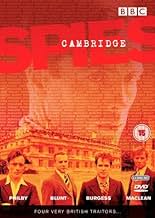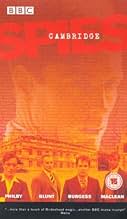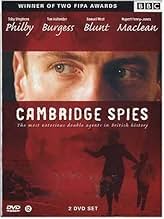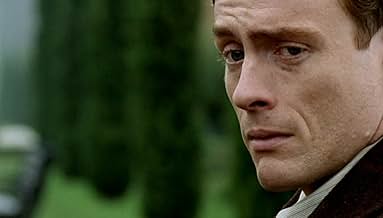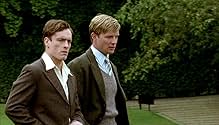PUNTUACIÓN EN IMDb
7,4/10
2,4 mil
TU PUNTUACIÓN
La verdadera historia de un grupo de estudiantes de la Universidad de Cambridge que son reclutados para espiar para la Unión Soviética a principios de la década de 1930.La verdadera historia de un grupo de estudiantes de la Universidad de Cambridge que son reclutados para espiar para la Unión Soviética a principios de la década de 1930.La verdadera historia de un grupo de estudiantes de la Universidad de Cambridge que son reclutados para espiar para la Unión Soviética a principios de la década de 1930.
- Nominado a 4 premios BAFTA
- 3 premios y 5 nominaciones en total
Explorar episodios
Reseñas destacadas
This is a lightly fictionalised account of how four tewwibly well brought up English boys betrayed their country to the Soviet Union. Philby's father had been a distinguished diplomat and Arabist and McLean's a cabinet minister. All had public school educations and had been undergraduates at the same Cambridge college. They set off into promising careers in the foreign office and security services and were Soviet agents from the start. Their great coup was to give the Soviets enough details about the atomic bomb to speed up their program to build one by a couple of years, but it was at the expense of blowing McLean and Burgess's cover (they escaped to Moscow in 1951), and Philby being fired from MI6. He joined them in Moscow in 1963. Blunt, by now the Keeper of the Queen's Pictures was then interrogated; he confessed, and was let go.
It's one of the really great spy stories of the 20th century. This version concentrates on the personal dynamics. The amount of contact the spies had with each other after Cambridge seems to be much exaggerated (pretty bad security), but gives us the picture of the gang of four against the Establishment. The women are interesting too. Philby was a ladies' man to whom Donald McLean's American wife Melinda (Anne-Louise Plowman) was attracted. They later lived together in Moscow. Blunt and Burgess were both gay, but friends rather than lovers.
The Establishment, in the person of Lord Halifax (James Fox), Ambassador to Washington, found it difficult to believe that 'people like us' could do such things and started looking for the atomic spy in the embassy kitchens. One or two western counter-intelligence operatives including the CIA's formidable James Jesus Angleton nearly nabbed them, but with Philby tipping them off (and duchessing Angleton), Burgess and McLean made it safely to Moscow.
With four hours to play with all the characters are richly drawn. Tom Hollander's Guy Burgess is a drunken dirty little sod who somehow manages to be witty and charming as well. It was great cover for a spy. As Donald McLean, Rupert Penry-Jones is the Golden Boy who feels himself unworthy, and sees communism as the way to redemption. Toby Stephens as Kim Philby gives us the cleverness, the deviousness and the angst as well, especially in the Spanish episode.(I'm afraid us Philbys are a devious lot, but we bleed, we bleed). Samuel West's Blunt has the occasional hint of emotion, but basically is a cold fish. Art, it seems is his life. He does get on tewwibly well with the Queen.
Seventy years on, it's not so much why they did it, but why they kept it up that mystifies. Given their location close to the heart of British Intelligence and hence knowing as much as anybody outside about what really went on the Soviet Union, it's extraordinary that Philby and McLean in particular continued on right up to 1951 (Blunt was more or less inactive after 1945). It is suggested here that Ms McLean did try to get her husband to give up spying but there's no real explanation as to why he persisted. Perhaps he still believed. Anyway, truth or fiction is hardly the point here - Sunday night is not for history lessons. This is a familiar tale well told, visually splendid and not too taxing. The real story, I suspect, is far too complex for even the most adroit (or left) TV producer. An earlier TV account,"Philby Burgess and McLean" (1977) is also worth watching, if you can find it.
It's one of the really great spy stories of the 20th century. This version concentrates on the personal dynamics. The amount of contact the spies had with each other after Cambridge seems to be much exaggerated (pretty bad security), but gives us the picture of the gang of four against the Establishment. The women are interesting too. Philby was a ladies' man to whom Donald McLean's American wife Melinda (Anne-Louise Plowman) was attracted. They later lived together in Moscow. Blunt and Burgess were both gay, but friends rather than lovers.
The Establishment, in the person of Lord Halifax (James Fox), Ambassador to Washington, found it difficult to believe that 'people like us' could do such things and started looking for the atomic spy in the embassy kitchens. One or two western counter-intelligence operatives including the CIA's formidable James Jesus Angleton nearly nabbed them, but with Philby tipping them off (and duchessing Angleton), Burgess and McLean made it safely to Moscow.
With four hours to play with all the characters are richly drawn. Tom Hollander's Guy Burgess is a drunken dirty little sod who somehow manages to be witty and charming as well. It was great cover for a spy. As Donald McLean, Rupert Penry-Jones is the Golden Boy who feels himself unworthy, and sees communism as the way to redemption. Toby Stephens as Kim Philby gives us the cleverness, the deviousness and the angst as well, especially in the Spanish episode.(I'm afraid us Philbys are a devious lot, but we bleed, we bleed). Samuel West's Blunt has the occasional hint of emotion, but basically is a cold fish. Art, it seems is his life. He does get on tewwibly well with the Queen.
Seventy years on, it's not so much why they did it, but why they kept it up that mystifies. Given their location close to the heart of British Intelligence and hence knowing as much as anybody outside about what really went on the Soviet Union, it's extraordinary that Philby and McLean in particular continued on right up to 1951 (Blunt was more or less inactive after 1945). It is suggested here that Ms McLean did try to get her husband to give up spying but there's no real explanation as to why he persisted. Perhaps he still believed. Anyway, truth or fiction is hardly the point here - Sunday night is not for history lessons. This is a familiar tale well told, visually splendid and not too taxing. The real story, I suspect, is far too complex for even the most adroit (or left) TV producer. An earlier TV account,"Philby Burgess and McLean" (1977) is also worth watching, if you can find it.
A very highly fictionalised account - but why did it need to be? The story of the Cambridge Five really did deserve better than this.
As drama it can't be faulted, but as a depiction of historical events it left much to be desired. We British are prone to look down upon the American TV movie, and for all the same reasons that were evident in the Cambridge Spies.
The story of the Five is well known enough for me not to have to point out the inaccuracies involved in this production, but beyond that I had no real sense of time and place, and certainly no sense of the evil these men did and the horrors and tragedies that came about as a result of their activities. In four hours there was room enough to get it right.
Some events were tick-boxed in glib exchanges, others rendered risible - the horror of Guernica reduced to one aged aeroplane with German markings, a mother, her son, the rattle of gunfire, the inevitable priest who rushes to the aid of the dead boy.
Philby lost his stammer, MacLean's bisexuality was never hinted at, Burgess became almost a paragon of virtue compared with the reality of the man, and Blunt...
The appeal of this series was, whatever the BBC might say, that it was based around real events. In that case I feel the viewer has a right to expect factual accuracy, otherwise the fictionalisation may as well have extended to the substitution of fictional names for the characters, and the excising of the "what happened next" text before the end-credits.
As BBC drama this was well up to standard, as BBC factual drama it took a long step in the wrong direction.
As drama it can't be faulted, but as a depiction of historical events it left much to be desired. We British are prone to look down upon the American TV movie, and for all the same reasons that were evident in the Cambridge Spies.
The story of the Five is well known enough for me not to have to point out the inaccuracies involved in this production, but beyond that I had no real sense of time and place, and certainly no sense of the evil these men did and the horrors and tragedies that came about as a result of their activities. In four hours there was room enough to get it right.
Some events were tick-boxed in glib exchanges, others rendered risible - the horror of Guernica reduced to one aged aeroplane with German markings, a mother, her son, the rattle of gunfire, the inevitable priest who rushes to the aid of the dead boy.
Philby lost his stammer, MacLean's bisexuality was never hinted at, Burgess became almost a paragon of virtue compared with the reality of the man, and Blunt...
The appeal of this series was, whatever the BBC might say, that it was based around real events. In that case I feel the viewer has a right to expect factual accuracy, otherwise the fictionalisation may as well have extended to the substitution of fictional names for the characters, and the excising of the "what happened next" text before the end-credits.
As BBC drama this was well up to standard, as BBC factual drama it took a long step in the wrong direction.
While not unhistorical, this is a very garbled and misleading presentation of the spies in question. Presumably, historical truth is sacrificed for dramatic reasons. But Cambridge Spies doesn't manage to rise to the level of drama. It's melodrama. There are moments when, if you turn off the sound, you'd swear you were watching a not very good silent movie: sentimental and over-wrought. The Guernica scene is a case in point; Guy Burgess, emoting in the rain, lamenting the death of Julian Bell is another. Rather a waste of acting talent. The main characters in this effort have each done other work that displays their talents to much better effect.
Since no one has said so yet, it seems necessary to add this.
The series is an excellent drama, in every way - no doubt about that. Well worth watching.
BUT.
And that is the point: The subject of this drama is politics, international affairs, government, intelligence - and these are largely absent from the drama.
So if you are prepared to enjoy a view of the events from the perspective of the personal lives of the main characters, then all is fine. But if you were looking for more than tenuous references to the events and forces at play in the world, and an account of how the characters of the story were involved in those events and forces, you will miss something...
This is not to say that it's a bad drama - it's still excellent. And lavishly designed and produced.
But those political events and forces were of historic importance. At a time where the world was still strongly driven by ideological currents, and there was a ruthless struggle for world domination.
In my view, that is even higher drama, and I missed those connections.
The series is an excellent drama, in every way - no doubt about that. Well worth watching.
BUT.
And that is the point: The subject of this drama is politics, international affairs, government, intelligence - and these are largely absent from the drama.
So if you are prepared to enjoy a view of the events from the perspective of the personal lives of the main characters, then all is fine. But if you were looking for more than tenuous references to the events and forces at play in the world, and an account of how the characters of the story were involved in those events and forces, you will miss something...
This is not to say that it's a bad drama - it's still excellent. And lavishly designed and produced.
But those political events and forces were of historic importance. At a time where the world was still strongly driven by ideological currents, and there was a ruthless struggle for world domination.
In my view, that is even higher drama, and I missed those connections.
Well made and acted but I'm afraid it didn't have the guts to show the reality of the result of their treason. Why did we not see the suffering and death of the agents whom the Cambridge spies betrayed? Why did they never confront the hypocrisy of helping a regime which sides with Hitler, imprisons its' population and regularly executes their KGB contact agents? It tries to be sympathetic to men who put their loyalty to their friends above their loyalty to their country, their colleagues and those they're supposed to be protecting. What's more even that is incredibly flawed, Blunt abandons the rest of the group to their fate, Philby sleeps with McClean's wife and sends Burgess to accompany him into exile behind the Iron Curtain unaware that he's never coming back to the UK (and will quickly drink himself to death in Moscow).
What's more it only seems to tell half the story, concentrating disproportionately on the recruitment process and the influence of the Spanish civil war on the group. We get none of the fallout from the defection which was a revelation in Britain at the time or Philby's infamous press conference which is still cited today as a classic example of how to lie, we never get Philby's flight from Beruit or McClean and Caincross' plea bargain. Perhaps the most sympathetic character in the whole story is James Jesus Angleton who appears to be the lone voice in the wilderness.
So all told a great series but do some research first.
What's more it only seems to tell half the story, concentrating disproportionately on the recruitment process and the influence of the Spanish civil war on the group. We get none of the fallout from the defection which was a revelation in Britain at the time or Philby's infamous press conference which is still cited today as a classic example of how to lie, we never get Philby's flight from Beruit or McClean and Caincross' plea bargain. Perhaps the most sympathetic character in the whole story is James Jesus Angleton who appears to be the lone voice in the wilderness.
So all told a great series but do some research first.
¿Sabías que...?
- CuriosidadesBased on the same real life events as Otro país (1984), History in Faces: Cambridge Five (2011), Espías para la historia (1977), A Question of Attribution (1991), An Englishman Abroad (1983), El topo (2011), Calderero, sastre, soldado, espía (1979), Blunt (1987), Traitor (1971), Blade on the Feather (1980), El hombre rompecabezas (1983) and influenced the source novels of El cuarto protocolo (1987), El inocente (1993) and others works such as Tercera identidad (2004) and Olding (2019), even in minor form like in The Imitation Game (Descifrando Enigma) (2014).
- PifiasGuy Burgess is in a London flat eating Van Camps baked beans from a can. This brand is not available in England.
- Citas
Guy Burgess: Vladivostok, Moscow, the Kusnetsk Basin, Cambridge - the coldest places on Earth. Of the four, Cambridge is the coldest, permanently February the nineteenth.
- ConexionesVersion of Espías para la historia (1977)
- Banda sonoraJerusalem
by Hubert Parry
Selecciones populares
Inicia sesión para calificar y añadir a tu lista para recibir recomendaciones personalizadas
Detalles
- Fecha de lanzamiento
- País de origen
- Sitio oficial
- Idioma
- Títulos en diferentes países
- Cambridge Spies
- Localizaciones del rodaje
- Empresas productoras
- Ver más compañías en los créditos en IMDbPro
Contribuir a esta página
Sugerir un cambio o añadir el contenido que falta

